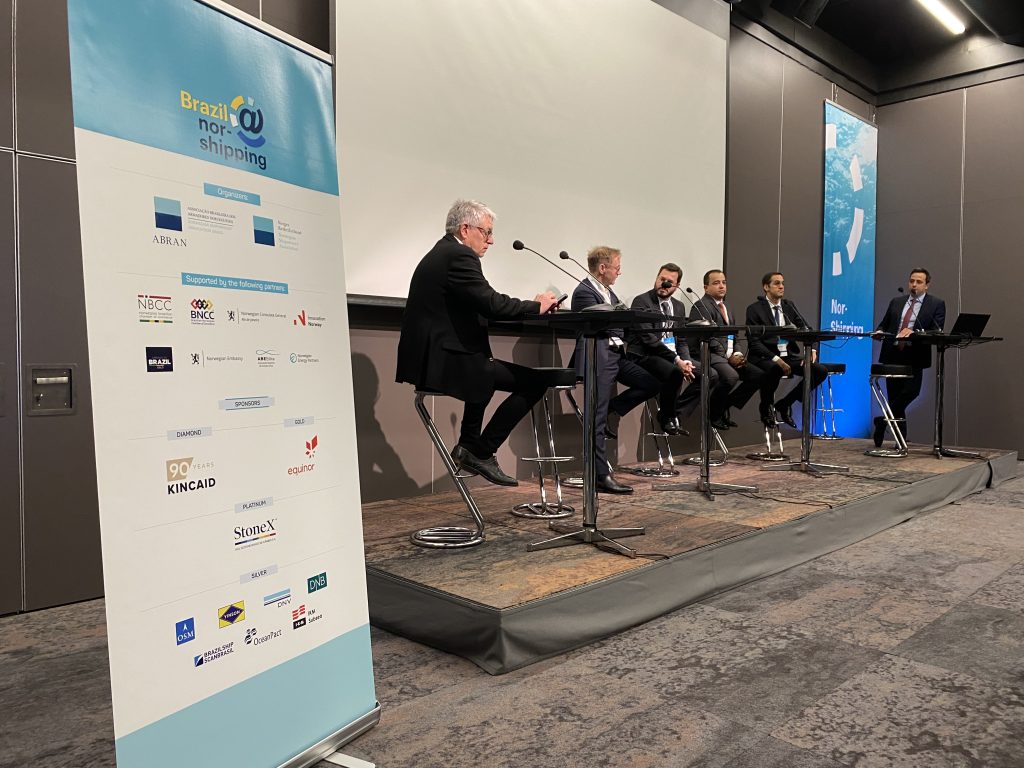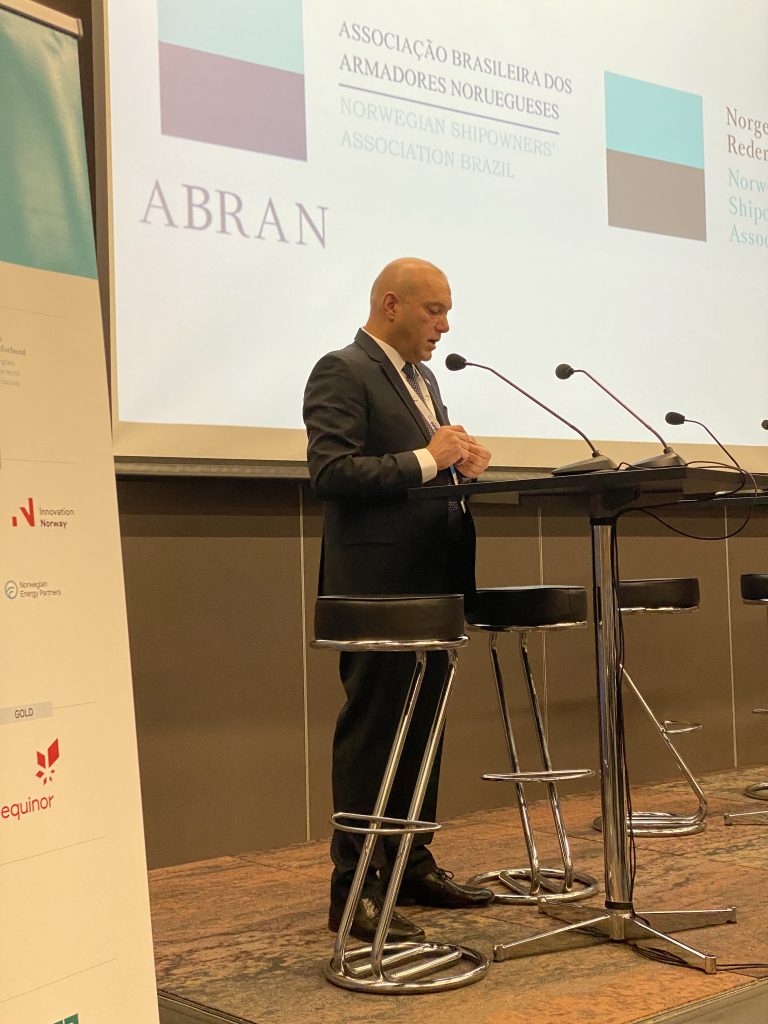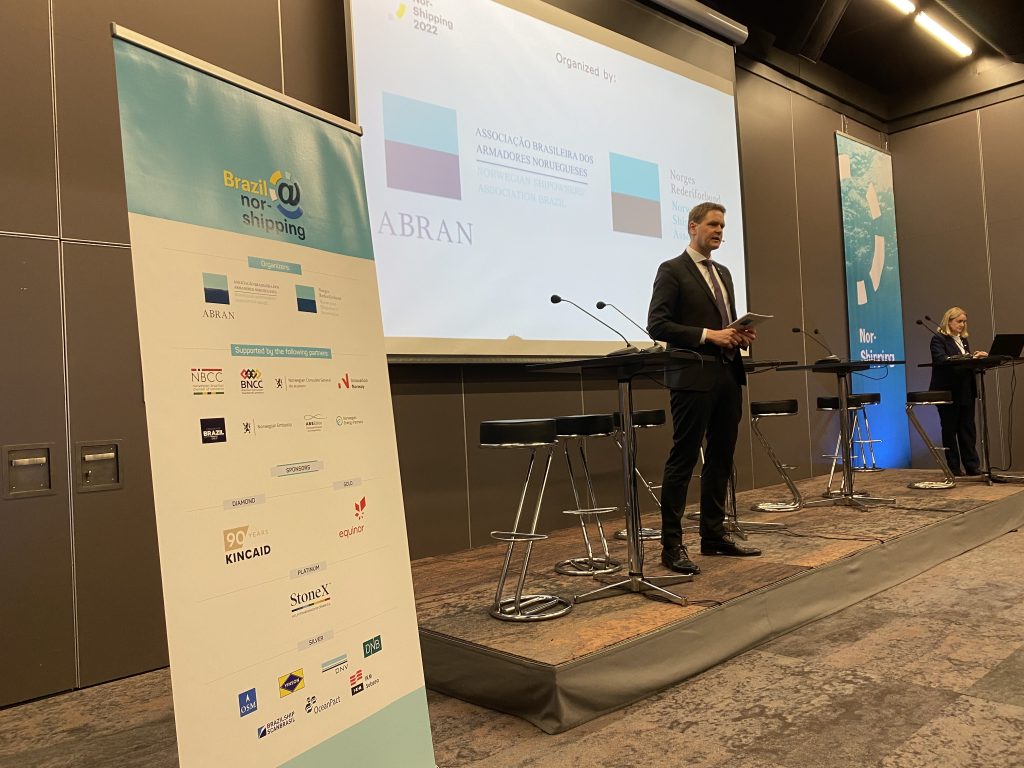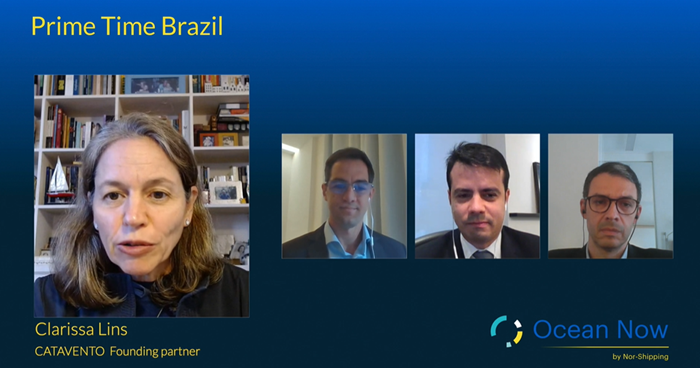After more than two years of social restrictions due to the covid-19 pandemic, Nor-Shipping weeklong program, 4th to 7th April, in Lillestrøm and Oslo, provided to be the perfect arena to reflect on trends and challenges of the world and discuss premising topics of the global offshore and maritime shipping industry, at the same time allowing intense social interaction among key players of the industry.
Brazil, for the 4th consecutive time, headlined the main event with a dedicated agenda organized by ABRAN/NSA focus on current and upcoming business opportunities. The Brazilian delegation was formed by business leaders, authorities and stakeholders from different sectors, including the Brazilian Ambassador, H.E. Mr. ENIO CORDEIRO, Director General of Navigation, Fleet Admiral WLADMILSON BORGES, Director General of National Regulatory Agency of Petroleum – ANP, Rear Admiral (Ret.) RODOLFO SABOIA, Director General of National Regulatory Agency for Waterways Transport and Ports – ANTAQ, Mr. EDUARDO NERY, Director of Ports and Coasts, Vice Admiral SERGIO SALGUERINHO, President of Maritime Court, Vice Admiral (Ret.) WILSON LIMA FILHO, Deputy Secretary of Climate and International Affairs, Mr. MARCELO DONINNI FREIRE, Director of Infrastructure Development, Mr. RAFAEL FURTADO, Head of Ports and Offshore installation licensing from IBAMA, Ms. ROBERTA COX, CEO of Brazilian Association of Wind power – ABEEOLICA, Ms. ELBIA GANNOUM, General Manager of Petrobras Suppliers relationship, Mr. MARCELO PEREIRA, General Manager Petrobras Subsea Operations, Mr. MARCUS ARAÚJO, Head of Supply Chain of Equinor Brazil, Mr. RAFAEL TRISTÃO and many others representatives from the industry.

The weeklong program started with – The Ocean Leadership Conference – opened by the speech of Mr. Bjørnar Selnes Skjæran Norwegian Minister of Fisheries and Ocean Policy. The conference was built around the theme #ACTION and showcased concrete examples of actions companies have taken to manage existing challenges and explore innovative ways companies can build more resilient, profitable, and environmentally responsible business models to survive and thrive.
The Brazil@Nor-Shipping seminar, in Lillestrøm, was attended by more than 100 people and was opened by Mr. FELIPE MEIRA, President of ABRAN, The Norwegian Shipowners Association in Brazil, welcoming all participants and highlighting the devastating impacts of the corona pandemic, in Brazil and Norway, “with tragic losses and economic burden being felt until today”.
Mr. Meira also pointed out that “the astonish Russia invasion on Ukraine aggravated the already challenging economic and geopolitical landscape, bringing back vivid memories from the Second World War, with the shelling, curfews, and underground shelters.”

According to Mr. Meira “The global maritime and offshore shipping industry proved to be resilient during these challenging times, keeping the flow of international trade and services.” And emphasized that “We shall recognize the essential role of seafarers, keyworkers, who were heavily affected by disruptions on flights and road transportation, connected to social restrictions.”
Following the President of ABRAN opening speech, CEO of NSA, Mr. Harald Solberg addressed the audience recognizing the strategic importance of Brazil to the Norwegian Shipowners, presenting some impressive figures demonstrating the Norwegian investments in Brazil, especially in the offshore and maritime industry. According to Mr. Solberg, “Nowadays, the level of Norwegian accumulated direct investments in Brazil, without asset transfer, exceeds 32.5 billion of USD, according to the latest investment report, creating thousands of job opportunities and positive impact for the Brazilian society. Most of the largest Norwegian companies are present in Brazil with significant and long-term investments.”
Mr. Solberg also mentioned that “According to the latest NSA Maritime Outlook Report, Brazil is the most important market, outside the North Sea, for Norwegian shipowners from the offshore segment, and is also one of the main markets for deep sea and drilling rig sectors. The country recently approved a new Decree outlining the legal and regulatory framework for the offshore wind sector and also passed a new Law for the cabotage, which we hope will increase the presence of Norwegian shipowners in the country.”

Norwegian Deputy Minister, from the Ministry of Trade Industry and Fisheries, Ms. JANICKE ANDREASSEN was invited to the stage by Mr. Harald Solberg and reflected on the long-lasting relationship between Brazil and Norway.
The conference Brazil@Nor-Shipping was built to explore the Brazilian economic and market outlook, its business opportunities, concrete actions towards the target of zero emission, and the potential to strengthening partnership with Norwegian Ocean industry´s players to foster a sustainable market environment, in both countries.
During the week, the Brazilian delegation visited the exhibition hall and could witness the great variety of technologies currently available to increase energy efficiency and reduce carbon emissions in the maritime industry. Also, the Brazilian delegation followed a very busy schedule of bilateral meetings, seminars, and social network events.
The Brazilian Ambassador, Mr. Enio Cordeiro welcomed the Brazilian delegation, on his official residence offering great and additional opportunity to strengthening ties of friendship and mutual knowledge between Brazilian and Norwegian stakeholders.
According to Mr. RICARDO FERNANDES, the Executive Director of ABRAN, Brazil@Nor-Shipping 2022 was, by far, the most challenging edition to plan and organize, but the event exceeded all expectations, with attractive topics and a very special delegation, the event promoted great interaction between Brazilian and Norwegian stakeholders, reflecting on current and upcoming business opportunities and strengthening ties of partnership between the two countries.
For 2023, according to Mr. Fernandes, the new dates for Brazil@Nor-Shipping are already set, 5th to 8th June, and ABRAN/NSA will once more engage with its partners to plan and organize a great event!



